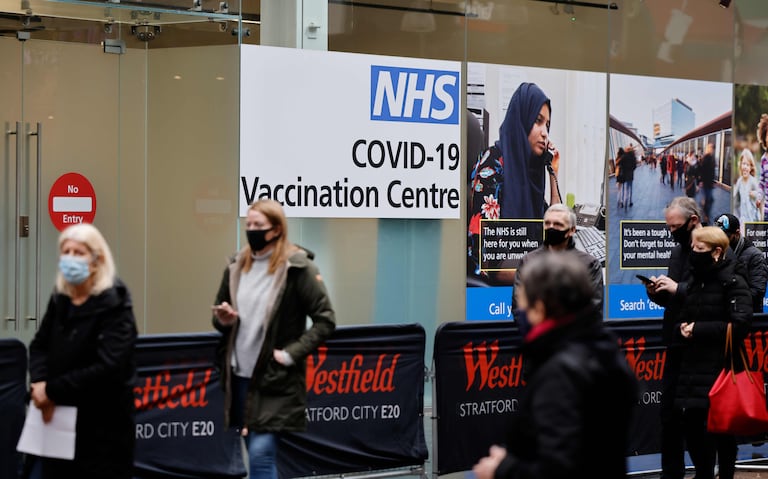Queue in front of a vaccination center, this Monday in London.TOLGA AKMEN / AFP
Wounded and tired, counting its dead by the thousands every day, Europe still has a long way to go to leave the nightmare of the coronavirus behind.
This is warned by the European Center for Disease Control and Prevention (ECDC, for its acronym in English), which states that the variants draw a horizon in which the restrictions will have to be “maintained” and “reinforced” for months — foreseeably until summer - while another threat gains strength, the so-called pandemic fatigue, which "needs to be addressed urgently if new waves of infection are to be avoided."
The recent reduction in the incidence of new cases in most countries and the spread of vaccines are practically the only two good news that can be found in the 29 pages of the latest update of the risk report on the pandemic, released this Monday by the ECDC.
And even in these cases there are nuances.
In the first, because "the epidemiological situation continues to be very worrying", with "high notification rates" and "high mortality".
And in relation to vaccines, "it is too early to detect an impact on mortality or hospitalizations," says the report.
Coronavirus in Spain: these are the new restrictions by autonomous communities
The document highlights that the continent has registered "since January 21 a substantial increase in the number and proportion of cases of SARS-CoV-2 of the B.1.1.7 variant", detected for the first time in the United Kingdom.
"In Ireland it is the dominant variant and several countries will be in a similar situation in the coming weeks," says the ECDC.
This has already caused "an increase in hospitalizations, has overloaded health systems and caused excess mortality."
The detection of cases of the B.1.351 variant, discovered in South Africa, is also growing, although much lower for now, “not only associated with travel, but also with outbreaks”.
In contrast, the P.1 variant —also called Brazilian— has the “lowest levels” of detection.
The sum of factors related to these most contagious variants and evidence that they can cause “more serious” clinical conditions and make vaccines less effective lead the ECDC to qualify from “high to very high for the general population and very high for vulnerable people” the risk associated with its spread.
The models managed by the ECDC suggest that it will be necessary to maintain the restrictions —masks, mobility and social interaction—, and even “strengthen” them during “the next few months” if “a significant increase in cases and deaths” is to be avoided.
"Although vaccination will mitigate the effect of replacement of the most communicable variants, and seasonality can reduce transmission during the summer months, prematurely flexing measures will lead to a rapid increase in incidence, detection of serious cases and mortality," he says. the ECDC.
"It may seem like a harsh report, but I would say that it is limited to presenting reality as it is," says Daniel López Acuña, former director of Health Action in Crisis at the World Health Organization.
“We are facing a complicated scenario and there are no shortcuts to get out of it.
We were wrong before and rushing to relax restrictions would be the first step towards another wave in March, "he warns.
Relaxation
The ECDC considers it essential that the restrictions - which it calls non-pharmaceutical interventions - are strengthened and maintained in the coming months to reduce the incidence to the lowest possible levels, "thus also minimizing the opportunities for new variants to emerge," the report states.
Juan Carlos Galán, head of virology at Hospital Ramón y Cajal (Madrid) agrees on the need to "not give opportunities to the virus."
"If its circulation is higher, if there are more infections, the chances of accumulating mutations are greater.
This increases the risk of variants that can cause more serious clinical conditions and make vaccines less effective.
And that is a risk that we cannot afford ”, he sums up.
The ECDC recommends avoiding "non-essential travel as part of the general measures" and predicts that "it is likely that variants will continue to emerge against which currently licensed vaccines could have reduced efficacy", as has already been observed in some cases with the South African variant.
José Luis Alfonso, professor of Preventive Medicine and Public Health at the University of Valencia, sees the European situation caught between two forces.
“The hope of a rapid vaccination has been frustrated and the restrictions must be maintained.
Meanwhile, social fatigue and the economic impact of the measures increases.
A few months await us in which it will be essential to manage a complicated environment ”, he values.
Alfonso sees margin in making some measures more flexible, there "where the evidence shows that the risk of aerosols is very low, such as terraces", but urges to avoid "a precipitous de-escalation before moments like Holy Week or festivals such as Fallas."
The risk of fatigue
The ECDC highlights the “riots” in several cities against the restrictions and urges countries to “carefully manage expectations about the likelihood of easing” these measures. At stake are key interventions to "prevent new waves of infections." The sociologist Josep Lobera, a professor at the Autonomous University of Madrid (UAM), interprets these messages as "a warning to countries that this is not the time to lower their guard." But he also misses "a broader look." “If you see that there are systematically population groups that are skipping the measures, you have two options. The first is to continue imposing fines, but there is another, which is to consider new alternatives ”. And he gives as an example the case of young people last summer, ordered to stay at home and with hardly any leisure options instead of "looking for formulas so that they could socialize in open and safe spaces."







